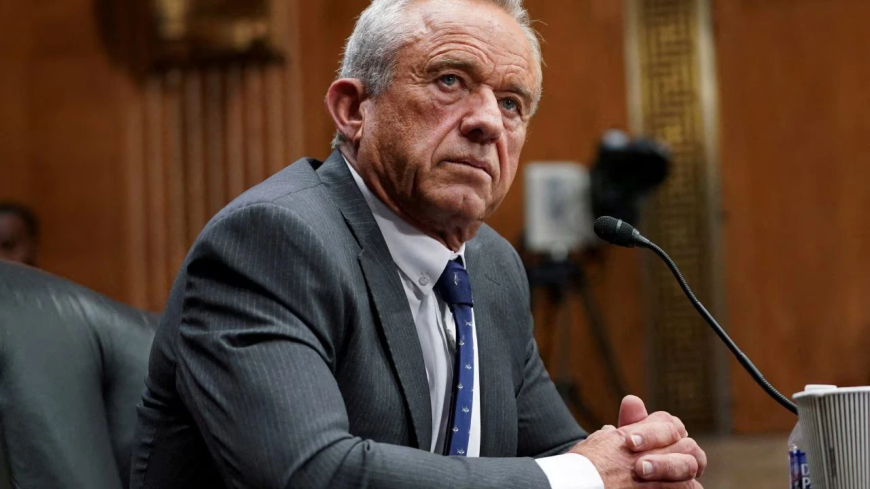Senate Democrats Confront Health Secretary RFK Jr. Over Vaccine Skepticism, Calling It “Politically Dangerous”
Senate Democrats clashed with Health Secretary Robert F. Kennedy Jr. over his vaccine skepticism, calling it politically dangerous and a threat to public trust in health policy.

A Contentious Capitol Hill Hearing
A heated Senate hearing unfolded this week as Democratic lawmakers directly challenged Health and Human Services Secretary Robert F. Kennedy Jr., pressing him over his long-standing vaccine skepticism. Senators accused the secretary of allowing “politically motivated rhetoric” to undermine public health at a time when the nation is still grappling with medical misinformation.
The confrontation marked one of the most combative appearances of RFK Jr. since taking office earlier this year, and it underscored the growing tensions between his controversial past statements and his current role as the nation’s top health official.
Democrats Push Back Hard
Led by Senate Health Committee Chair Patty Murray (D-WA), Democrats questioned whether Kennedy could effectively lead the department while maintaining credibility on vaccine safety. Murray argued that his past comments—many of which questioned the safety of childhood immunizations and COVID-19 vaccines—risk emboldening anti-vaccine movements.
“Mr. Secretary, words from your office matter,” Murray said during the hearing. “When Americans hear skepticism from the nation’s health chief, it doesn’t just create confusion—it creates danger.”
Other Democratic senators echoed the concern. Sen. Elizabeth Warren (D-MA) warned that Kennedy’s comments could lead to lower vaccination rates, particularly in vulnerable communities. Sen. Bernie Sanders (I-VT) called the issue “a matter of life and death,” stressing the responsibility of government leaders to promote science-based health policies.
RFK Jr. Defends His Position
Kennedy, visibly frustrated by the line of questioning, insisted that his past remarks have been mischaracterized. He argued that his skepticism has always been about “ensuring transparency and accountability in pharmaceutical practices,” not about dismissing vaccines entirely.
“I am not anti-vaccine,” Kennedy said. “What I am is pro-safety, pro-transparency, and pro-informed consent. My duty as secretary is to restore trust in public health institutions, not to rubber-stamp pharmaceutical companies.”
While he promised to uphold federal immunization programs, his answers did little to assuage Democratic critics.
A Politically Charged Battle
The exchange reflects a broader political struggle over public health messaging in America. Kennedy, who has built a reputation as a critic of government health agencies, was a controversial pick for the role. His appointment drew praise from some Republicans who view him as a truth-teller against “establishment science,” while Democrats have largely seen his rhetoric as a liability.
According to The Washington Post, Kennedy’s confirmation hearings were among the most polarizing in recent memory, with experts warning that mixed signals on vaccines could threaten hard-won public health gains.
Public Health Experts Weigh In
Medical professionals have also weighed in on the controversy. Dr. Leana Wen, a public health professor at George Washington University, said Kennedy’s remarks risk “legitimizing conspiracy theories” that could undo years of progress in disease prevention.
“We have seen the consequences of vaccine misinformation during the pandemic—hesitancy leads to outbreaks, hospitalizations, and preventable deaths,” Wen said.
The Centers for Disease Control and Prevention (CDC) has consistently reported that vaccines remain one of the safest and most effective tools for preventing infectious disease. Public health officials now worry that political disputes at the top of government could filter down to communities already skeptical of health authorities.
The Stakes Ahead
For Senate Democrats, the fight is about more than just Kennedy’s record—it’s about maintaining the credibility of the nation’s health institutions. With childhood immunization rates slipping in some states and misinformation spreading rapidly online, lawmakers fear that any mixed messages could trigger a resurgence of preventable diseases.
Republicans, meanwhile, have largely defended Kennedy, framing the criticism as partisan. They argue that his willingness to challenge pharmaceutical interests and government agencies brings much-needed accountability to Washington.
Looking Forward
The clash over Kennedy’s vaccine views highlights how public health has become deeply politicized in the United States. What once was a bipartisan consensus around science and disease prevention has now become a battlefield for ideological disputes.
As the secretary continues to navigate his role, observers say his ability to build trust—without fanning the flames of division—will be critical. Whether Kennedy can walk that tightrope remains uncertain, but one thing is clear: Senate Democrats plan to keep pressing him, framing vaccine trust not just as a policy issue but as a national security priority.



















































